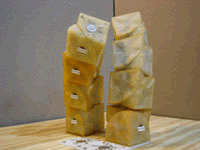 |
| image courtesy Cornell University |
Cornell Researchers Viktor Zykov, Efstathios Mytilinaios, Bryant Adams, and Hod Lipson have built a self-replicating robot (video). The robot itself is just a basic proof-of-concept — their real contribution is how they try to redefine the whole concept of self-replication from being a “you either have it or you don’t” binary property to being a continuum. From their FAQ:
Contrary to previously held views that self-replication is a property that a system either has or has not (“you can’t be half pregnant”), our theory suggests that it is actually a continuum, where different systems can self-reproduce to different extents. The extent to which a system is self replicating depends on things like how fast does it self replicate, how accurately does it self replicate, how dependent is it on its environment to self replicate, how complex are its building blocks, how complex it is itself, etc. etc. For example, crystals self replicate, but only in a solution; rabbits self-replicate – less accurately and more slowly than a crystal – but they are less dependent on having a specific environment.